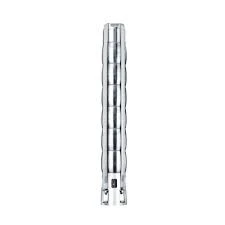Oct . 20, 2024 21:57 Back to list
Water-Filled Submersible Pump Advantages and Applications for Efficient Fluid Transfer
The Advantages of Water-Filled Submersible Pumps
Submersible pumps have been a significant advancement in the design and functionality of fluid handling systems. Among the range of submersible pumps available, water-filled submersible pumps stand out due to their efficiency, reliability, and versatility. In this article, we will explore the unique features of water-filled submersible pumps, their applications, and why they are an optimal choice for various water-moving tasks.
What is a Water-Filled Submersible Pump?
A water-filled submersible pump is a type of pump that operates underwater and is designed to transfer fluids, specifically water, from one location to another. As the name suggests, these pumps are filled with water within their motor casing instead of oil or other lubricants. This design not only cools the motor effectively but also prevents overheating and extends the pump's operational life.
Key Features
1. Cooling Mechanism The primary advantage of using water as a filling substance is its excellent thermal conductivity. Water-filled submersible pumps can dissipate heat quickly, which keeps the motor at optimal operating temperatures, enhancing performance and longevity.
2. Environmental Safety Unlike oil-filled pumps, which can pose environmental hazards in case of leaks, water-filled pumps are safer for both the environment and human health. They eliminate the risk of oil contamination, making them ideal for use in groundwater applications.
3. Cost-Effectiveness Water-filled submersible pumps tend to be less expensive than their oil-filled counterparts. The initial investment is lower, but operational efficiency and reduced maintenance needs further enhance their cost-effectiveness over time.
4. Versatility These pumps can handle a variety of tasks, from draining flooded basements to supporting agricultural irrigation systems. Their robust construction and ability to work efficiently in dynamic environments make them suitable for both residential and industrial applications.
Applications
water filled submersible pump

Water-filled submersible pumps are used in various sectors due to their adaptability and efficiency
- Construction In construction sites, these pumps are essential for dewatering purposes. They remove excess groundwater to keep the site dry during excavation and foundation work.
- Agriculture Farmers rely on submersible pumps to irrigate crops. They can transfer water from wells or nearby bodies of water to the fields, ensuring that crops receive adequate moisture.
- Sewage and Waste Management Water-filled pumps are commonly used in sewage treatment plants and waste management facilities to transfer waste fluids effectively while minimizing clogging issues.
- Fish Farming In aquaculture, these pumps facilitate water circulation and aeration in fish tanks, creating a healthier environment for aquatic life.
Maintenance and Considerations
While water-filled submersible pumps offer numerous advantages, proper maintenance is key to ensuring their longevity and efficiency. Regular checks for wear and tear, as well as cleaning of any debris that could obstruct the pump, are essential preventative measures. Additionally, users should verify that the pump is rated for the specific depth and application they intend to use it for to avoid premature failure.
Conclusion
In summary, water-filled submersible pumps represent a significant innovation in fluid handling technology. Their efficient cooling mechanism, environmental safety, and cost-effectiveness make them an ideal choice for many applications, ranging from construction to agriculture. As the importance of water management continues to grow in our rapidly changing world, these pumps will undoubtedly play a crucial role in sustainable practices and solutions. Their versatility and reliability ensure that they will remain a staple in both residential and industrial settings for years to come. Whether you are looking to upgrade your current pumping system or are in need of a reliable water transfer solution, consider the many benefits of water-filled submersible pumps.
-
Submersible Water Pump: The Efficient 'Power Pioneer' of the Underwater World
NewsJul.01,2025
-
Submersible Pond Pump: The Hidden Guardian of Water Landscape Ecology
NewsJul.01,2025
-
Stainless Well Pump: A Reliable and Durable Pumping Main Force
NewsJul.01,2025
-
Stainless Steel Submersible Pump: An Efficient and Versatile Tool for Underwater Operations
NewsJul.01,2025
-
Deep Well Submersible Pump: An Efficient 'Sucker' of Groundwater Sources
NewsJul.01,2025
-
Deep Water Well Pump: An Efficient 'Sucker' of Groundwater Sources
NewsJul.01,2025
-
 Submersible Water Pump: The Efficient 'Power Pioneer' of the Underwater WorldIn the field of hydraulic equipment, the Submersible Water Pump has become the core equipment for underwater operations and water resource transportation due to its unique design and excellent performance.Detail
Submersible Water Pump: The Efficient 'Power Pioneer' of the Underwater WorldIn the field of hydraulic equipment, the Submersible Water Pump has become the core equipment for underwater operations and water resource transportation due to its unique design and excellent performance.Detail -
 Submersible Pond Pump: The Hidden Guardian of Water Landscape EcologyIn courtyard landscapes, ecological ponds, and even small-scale water conservancy projects, there is a silent yet indispensable equipment - the Submersible Pond Pump.Detail
Submersible Pond Pump: The Hidden Guardian of Water Landscape EcologyIn courtyard landscapes, ecological ponds, and even small-scale water conservancy projects, there is a silent yet indispensable equipment - the Submersible Pond Pump.Detail -
 Stainless Well Pump: A Reliable and Durable Pumping Main ForceIn the field of water resource transportation, Stainless Well Pump has become the core equipment for various pumping scenarios with its excellent performance and reliable quality.Detail
Stainless Well Pump: A Reliable and Durable Pumping Main ForceIn the field of water resource transportation, Stainless Well Pump has become the core equipment for various pumping scenarios with its excellent performance and reliable quality.Detail
